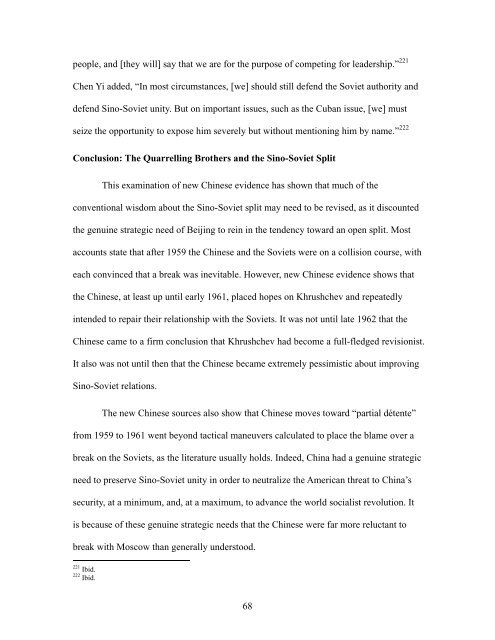The Quarrelling Brothers: New Chinese Archives and a ... - CiteSeerX
The Quarrelling Brothers: New Chinese Archives and a ... - CiteSeerX
The Quarrelling Brothers: New Chinese Archives and a ... - CiteSeerX
- No tags were found...
Create successful ePaper yourself
Turn your PDF publications into a flip-book with our unique Google optimized e-Paper software.
people, <strong>and</strong> [they will] say that we are for the purpose of competing for leadership.” 221Chen Yi added, “In most circumstances, [we] should still defend the Soviet authority <strong>and</strong>defend Sino-Soviet unity. But on important issues, such as the Cuban issue, [we] mustseize the opportunity to expose him severely but without mentioning him by name.” 222Conclusion: <strong>The</strong> <strong>Quarrelling</strong> <strong>Brothers</strong> <strong>and</strong> the Sino-Soviet SplitThis examination of new <strong>Chinese</strong> evidence has shown that much of theconventional wisdom about the Sino-Soviet split may need to be revised, as it discountedthe genuine strategic need of Beijing to rein in the tendency toward an open split. Mostaccounts state that after 1959 the <strong>Chinese</strong> <strong>and</strong> the Soviets were on a collision course, witheach convinced that a break was inevitable. However, new <strong>Chinese</strong> evidence shows thatthe <strong>Chinese</strong>, at least up until early 1961, placed hopes on Khrushchev <strong>and</strong> repeatedlyintended to repair their relationship with the Soviets. It was not until late 1962 that the<strong>Chinese</strong> came to a firm conclusion that Khrushchev had become a full-fledged revisionist.It also was not until then that the <strong>Chinese</strong> became extremely pessimistic about improvingSino-Soviet relations.<strong>The</strong> new <strong>Chinese</strong> sources also show that <strong>Chinese</strong> moves toward “partial détente”from 1959 to 1961 went beyond tactical maneuvers calculated to place the blame over abreak on the Soviets, as the literature usually holds. Indeed, China had a genuine strategicneed to preserve Sino-Soviet unity in order to neutralize the American threat to China’ssecurity, at a minimum, <strong>and</strong>, at a maximum, to advance the world socialist revolution. Itis because of these genuine strategic needs that the <strong>Chinese</strong> were far more reluctant tobreak with Moscow than generally understood.221 Ibid.222 Ibid.68
















